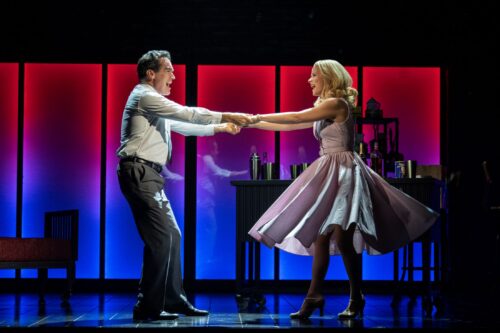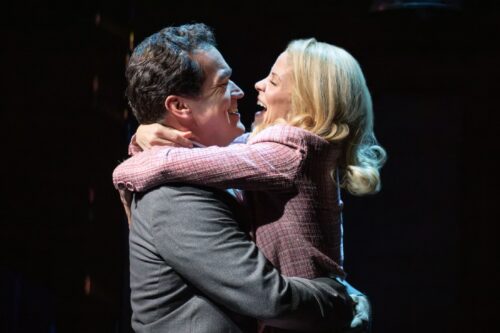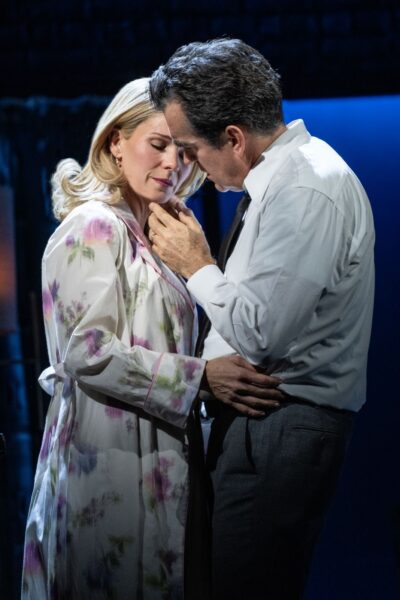LET’S RAISE OUR GLASSES AND CHEER
DAYS OF WINE AND ROSES
There is an old Irish proverb that goes “A man takes a drink, the drink takes a drink, the drink takes the man.” Based on a JP Miller’s 1958 play, and the brilliant 1962 film adaptation directed by Blake Edwards, Days of Wine and Roses is one of the quintessential stories on love and addiction — and that proverb is basically its plot.
Brian d’Arcy James is Joe Clay, a lighthearted and cynical public-relations executive, and a Korean War veteran, who is a serious alcoholic. In 1950 New York City, Joe relentlessly tries to entice a secretary, Kirsten Arnesen, played superbly by Kelli O’Hara, to join him in childish oblivion, although she never had a drink before and she has no intention to start now. With her Achilles’ heel, chocolate, mixed in a Brandy Alexander, he finally succeeds; the two fall madly in love and start their descent into the hell that is alcoholism.
To turn this tragedy into a musical — which opened tonight at Studio 54 — couldn’t have been easy. Yet Craig Lucas, who wrote the book, and Adam Guettel, who wrote the music and lyrics, succeeded, just as they did with The Light in the Piazza. From a jolly beginning during which we experience Joe and Kirsten’s high, and happily join their private never-ending-party with jazzy songs like “Evanesce” (“…doo-doo-doo… two people stranded at sea”) or “As the Water Loves the Stone”, we end up delving into a bleak, gripping, gut-wrenching account of the agony of this couple, and when we hear the same tunes we have opposite feelings. “Two dolphins breakin’ a wave, two dolphins right to the grave are we” doesn’t sound so cheery any longer.
Brian d’Arcy James is impeccable as the cruel charming executive looking for a drinking buddy; the exhilarant fiancé; and the frustrated husband who misses the high and hates domesticity; he is also a credible obsessive drunk, and, finally, a broken remorseful father.
Kelli O’Hara is a powerhouse and smoothly moves through the different stages of her character with immense passion. Three times Kirsten tries to stop drinking: when she is breastfeeding; after she accidentally burns their apartment with a lit cigarette; and when they are forced to live with her laconic, strict, Norwegian father, played persuasively by Byron Jennings. Each time Joe feels resentful toward her, and doesn’t stop until he successfully drags her back into drinking. O’Hara is whimsical as the spunky secretary, brutally realistic when drunk, self-loathing and devastated when she has to deal with the consequences — the social and cultural problems of the ’50s for a woman who “lost her way.” She is impeccable as an actress and she also sings 14 of the 18 songs, seven of them solos. From 1927 to 1929, Studio 54 was The Gallo Opera House; Kelli O’Hara’s ethereal soprano voice brought us back in time.
Their 7-year old daughter Lila, played by Tabitha Lawing, raises herself; both her parents love her dearly but they can’t help neglecting her. There are other characters: a compassionate A.A. sponsor, played by David Jennings, who helps Joe out of his hell; Sharon Catherine Brown as Mrs. Nolan, Bill English as Mr. Shaw, Olivia Hernandez as Betty, Tony Carlin as Rad, and David Manis as Delaney.
Michael Greif, the show’s director, made all the elements flow together, and time flies. Magically, set pieces appear and disappear while the lights behind the sliding glass doors give us the emotional temperature of each scene. Lizzie Clachan‘s set and Dede Ayite‘s costumes are excellent, creative, and extremely functional. The elegant lighting design by Ben Stanton gives us the needed pathos not to fall into despair, considering the subject. Even the bleakest scenes are illuminated in a clever way — Stanton never uses shortcuts like dim lighting or drastic shadows. Impressionist flowers and water projections follow stark modernist city scenes, and the colors always remind you we are in the late 50s and early 60s. Music is the most important character of the play (orchestrations by Guettel and Jamie Lawrence). The orchestra, led by Kimberly Grigsby, excels by never underplaying or overplaying, always keeping their voice alive and on point.
Yet, the best part of Days of Wine and Roses is the exquisite chemistry between Brian d’Arcy James and Kelli O’Hara, from the way they seamlessly match their voices to their acting and dancing (choreography by Sergio Trujillo and Karla Puno Garcia). Such a unique pairing we almost never see on stage; they feed on each other’s artistry, dare each other, give us all they can. Hopefully, the show will have a very long run.
photos by Joan Marcus
Days of Wine and Roses
Studio 54, 254 W. 54th Street
ends on March 31, 2024
for tickets, visit Days of Wine & Roses






